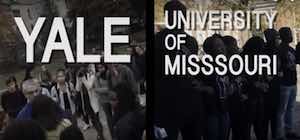It is always important to remember that the Constitution of the United States is not a law written by the government to control and limit the activities of the citizens. That is exactly backwards. The Constitution was authorized and approved by the early American revolutionaries to limit and control the activities of the government itself. The First Amendment made clear that Congress cannot abridge the freedom of speech. Yet over and over again, it’s interpreted to be freedom from interference and abridgment of speech by someone who’s not in the government and does not represent the government.
The children that we have in our colleges and universities in this country today seem to believe that if anything said by anyone offends them, if anything said by anyone hurts their feelings, or if anything said by anyone makes them feel threatened can be suppressed, forbidden and punished.
Sorry to tell you, but it seems that our students are right. At least in the legal sense. They are not in the government and they don’t represent the government, so the First Amendment doesn’t protect you or me from their desire to suppress what we say that might upset them.
On the bright side, it also means that their speech and their demands, are also not protected speech. Well it’s not protected by the government. The government itself cannot “abridge their freedom of speech” but this is not to say that the administrations of universities, colleges, trade schools and any other form of higher education is legally required to pretend that they are the government itself and therefore must protect the “right” to speak their minds no matter how ludicrous what comes out of their mouths may appear to be.
It appears that the First Amendment protects your freedom of speech from the government. But it does not protect what is commonly known as “free speech”.
Most Americans interpret (incorrectly) the phrase “free speech” as literally meaning your speech will never have a cost attached to it. It’s free! You can say whatever you want without any fear of retaliation, or punishment, or adverse impacts. Only a fool who lives in an fantasy world could possibly believe that.
Want proof?
There’s a significant difference between having the legally protected “right” to say whatever you like and the good “sense” not to say it. Let’s just say, for example, you walk into your bedroom while your wife is getting dressed. Then the most dangerous question that could possibly be asked of any man springs forth from the mouth of your spouse: “Does this dress make me look fat?”
Now any experienced man would say something along the lines of “Honey, of course not. Whenever I look at you, I see the same girl I married.”
However, the student body at Mizzou (or Yale, Dartmouth, Harvard, etc., etc., etc.) feeling that they are guaranteed the right, the legal right, to say whatever pops into their pinhead brains something more like “Boy do you ever look fat in that! You look like an 18-wheeler going down the street with both back doors open.” It would be a safe bet that anyone who “exercises” their legal right to express their opinions will be introduced, forcefully, to the legal concept of “alimony”.
See the difference between “freedom of speech” and “free speech”.
If the employee of a private corporation announces to the world that his or her employer makes second rate products it is unlikely they will stay in the employ of this corporation much longer than it takes for the payroll department cut the final check for this individual.
They may also find themselves the target of a lawsuit claiming defamation or libel or slander or any other charges the private corporation’s attorneys can come up with.
It appears that many people believe that no one, not just the government but no one, can preemptively deny you the right to say whatever pops into your head. Of course the only way an employer could do that, would be to require that employees clear whatever they say or write before they say it or write it. Of course trying to get employees to submit their thoughts and words to an employer is not only logistically impossible, but the adverse public relations impact would be a disaster. But terminating an employee who attacks his own employer could be a case in point of legal retaliation.
There’s no doubt in my mind that many universities might be considered “part of the government”. Since many state colleges and universities are primarily funded by government largess, they might have a case forcing them to protect “freedom of speech”. Of course that protection, constitutionally, would not extend to a forceful response to students who ignore the regulations of such institutions. But the students would undoubtedly get aid from lawyers representing the extreme left.
Again, the protection of “freedom of speech” is not the same as “free speech”. Sadly, the school system here in the United States fails miserably at teaching students, at all levels, what the Constitution does, and does not, guarantee.
The Constitution does offer us multiple protections from our own government. Unfortunately it provides us with an equal number of headaches from that very same government.
 The phrases “free speech” and “freedom of speech” are being used over and over as if they were interchangeable. Yet they mean utterly different things.
The actual phrase “freedom of speech” is used in the First Amendment of the Constitution. See for yourself (with emphasis added):
The phrases “free speech” and “freedom of speech” are being used over and over as if they were interchangeable. Yet they mean utterly different things.
The actual phrase “freedom of speech” is used in the First Amendment of the Constitution. See for yourself (with emphasis added):